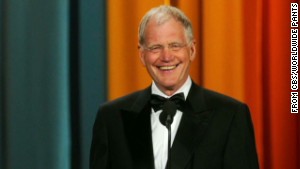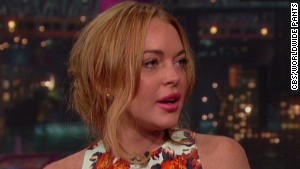Editor's note: David Bianculli is founder and editor of TVWorthWatching.com and teaches TV and film at Rowan University in New Jersey. He also is TV critic and guest host for NPR's "Fresh Air with Terry Gross." The opinions expressed in this commentary are those of the author.
(CNN) -- When David Letterman made the surprise announcement on Thursday's "Late Show with David Letterman" that he planned to retire in 2015, his stated reasons were that he was just about to turn 67, had been doing the job for more than three decades and wanted to spend more time with his son and family. Hard to argue with any of that.
An unstated reason is probably that the younger new wave of late-night TV hosts is not only nipping at his heels but pulling ahead of him.
Most important of all, however, is that in the age of the Internet, the way viewers take in late-night TV is not what it was when Letterman was honing his style. The battle for viewers is now fought more with four-minute viral videos the next morning than complete shows with monologues and conversations as integral ingredients.
 David Bianculli
David Bianculli Today's late-night TV is about bite-size bits. Letterman liked to serve multicourse meals.
Indeed, his mastery of the form has kept him behind a talk-show desk for 33 years. Start with four months as the host of daytime's "The David Letterman Show" in 1980. Add the 1982-93 run of "Late Night with David Letterman" on NBC, followed by the "Late Show with David Letterman" run that's 21 years now and counting.
By the time Letterman walks out of the Ed Sullivan Theater for the last time, he'll have clocked a third of a century as a late-night TV host and monologist. That's longer than Johnny Carson, who was the former late-night king at 30 years. Longer than Jay Leno, who managed 20 in two different shifts. Longer than anyone at that very rarified, high-pressure job.
Like Steve Allen, Jack Paar and Dick Cavett before him, Letterman brought enough to the party to rank him as one of the very best. Even though Leno's "Tonight Show," a direct time-slot rival to Letterman's program on CBS, drew more viewers for most of its run, Letterman produced more memorable programs, more classic bits and -- as when he was the first New York talk-show host to return after, and react to, the terrorist attacks of September 11 -- more instances of truly classic television moments.
The speculation tying the timing of Letterman's departure to the introduction of Jimmy Fallon in February as the newest host of "The Tonight Show" probably has some validity. It's no secret that Letterman wanted to be Carson's successor and long saw NBC's "Tonight" as the crown jewel of late-night TV, which it had been throughout the reigns of Allen, Paar and Carson. After being passed over for Leno, Letterman subsequently saw the NBC job go to Conan O'Brien, to Leno again and then to Fallon.
 David Letterman: I'm retiring in 2015
David Letterman: I'm retiring in 2015  Ware jokes: Least bracket's not broken
Ware jokes: Least bracket's not broken  Lohan: Upcoming rehab is a 'blessing'
Lohan: Upcoming rehab is a 'blessing'  Letterman plants kiss on Amy Poehler
Letterman plants kiss on Amy Poehler Certainly, by the time Fallon started at "Tonight," Letterman was used to being beaten in the ratings by NBC, and that trend has only intensified. Since the latest late-night talent shifts, Fallon's "Tonight Show" has drawn about twice as many viewers as Letterman (5.2 million to Letterman's 2.7, with ABC's "Jimmy Kimmel Live" just behind Letterman at 2.6). In the coveted 18-49 demographic, Letterman comes in third, behind Kimmel as well as Fallon.
But the real shift isn't in who's watching but in who's not watching. "The Tonight Show" of the Carson era, so revered by Letterman (and by older viewers and TV critics like myself), was must-see TV before that term was invented. Millions of people didn't think of going to bed before hearing Carson's monologue, to get his take on what happened that day.
In 2014, though, that's simply not happening. Every term, I ask my college students at Rowan University how many of them watch any of the late-night shows as they're first televised. This includes even Comedy Central's "The Daily Show with Jon Stewart" and "The Colbert Report," for which they're the ideal target audience. And every term, fewer hands go up.
They are waiting for those pieces of the previous night's talk shows spoon-fed to them, either as morning-show highlights or as viral videos on news sites or shared by Facebook friends.
Perhaps, had the Internet come along many decades earlier, Carson's Ed Ames tomahawk throw would have gone viral -- but that's the only part viewers would have seen. The nightly monologues, as comedic currency, have been devalued, and the popularity of a show -- and a host -- can be measured as much today by quick hits of brilliant comedy business rather than a solid hour of entertainment.
Fallon, of course, is superb at this game; his musical bits alone are guaranteed to feed a steady course of streaming videos. Kimmel is good at it too, and even the host following Letterman on CBS, Craig Ferguson of "The Late Late Show," has attracted many millions of YouTube hits with snippets of his antics.
Letterman, like British counterpart Graham Norton on BBC America's "The Graham Norton Show" import, sees his show as a one-hour complete entity. That fewer members of his audience are seeing it that way may be the biggest reason he's leaving.
If no one is watching TV in real time any more, then what does being a "late-night" host even mean?
Follow us on Twitter @CNNOpinion.
Join us on Facebook/CNNOpinion.
{ 0 comments... read them below or add one }
Post a Comment